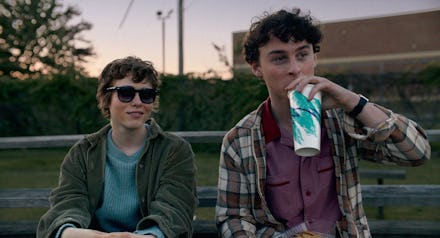Former Netflix showrunner says the company is "not interested in highlighting new voices"

Netflix just cannot stop canceling beloved TV series — and to get more specific, critically acclaimed series featuring diverse casts and filmmakers. Most recently, the buzzsaw came for wrestling dramedy Glow, whose cast reportedly asked for more representation before the show was axed. The list goes on: Tuca and Bertie, I Am Not Okay With This, One Day at a Time, Patriot Act, Everything Sucks, and more. The showrunner of two canceled series, I Am Not Okay With This and The End of the F***ing World’s Jonathan Entwistle sat down with Insider about the problems inherent to Netflix’s business model and their minimal regard for telling diverse stories.
“There's a real frustration at the moment in the business,” Entwistle says of Netflix and the broader industry’s revolving door approach to television. Despite fan outcry, Netflix has been rather transparent about its efforts to chop series after two or three seasons. I Am Not Okay With This, which was canceled after one season largely in part to the pandemic and executive changes at Netflix, was a hot starter for the platform, but according to Entwistle, became too costly despite the early successes:
“I think there are calculations within Netflix where they're just like "cost of show versus value," and not necessarily number of viewers because it's more complex than that with Netflix. We had amazing viewing figures for a show of that size. If you put ["I Am Not Okay With This"] on Hulu it would be mind blowing, but on Netflix it wasn't that impressive.”
Entwistle subtly jabs at the Netflix Twitter presence — a remarkably voicey, grating, and overactive institution. He explains how the social media support for a new series can be so fickle, extended only to the point when a show’s useful to the company's bottom line or out of momentum. Despite rabid fan bases staging literal flash mobs outside company headquarters post-cancellation, other considerations triumph:
“We started to realize that the fandom is very easily put into action when it suits Netflix to sell a show, and then immediately [when] the algorithm tells them the show is not worth pursuing by their calculations, they never post again. So it's like a Pavlov's dog thing. They feed, feed, feed, feed you stuff on Instagram and Twitter, and then they just take it away from you and they never respond again. It's like a harsh master-servant thing.”
But his most potent barbs come for the content factory itself, which tends to find one show that works and repeatedly crank out a half dozen others that look just like it. This methodology and short-attention span often comes at the expense of marketing diverse series, which can be useful to a company like Netflix in bursts, but ultimately falls well behind expanding and growing and crowding out the competition:
“And they all look the same, right? [The new shows] either look like Ryan Murphy [shows] or they look like CW. There's a tonal and aesthetic shift. It's very clear to me now, in the latter days of doing shows at Netflix, that they are a brand — you generate content that sells their brand. They're not interested in highlighting new voices in the television space. They're not interested in showcasing filmmaking intrigue. They're not excited about new ways of doing television and episodic. They're very interested in: "How can we spread the word of the brand globally?"
While Entwistle notes that creators have access to thorough viewing stats for their own series, it’s still largely a mystery to the public. Netflix has made a habit of revealing its top movies and shows through hilariously juiced-up numbers based on who’s tuned for just a few minutes. These numbers are notoriously difficult to parse and suggest that something like, say, Enola Holmes — a movie that’s hovered in the Netflix top 10 but otherwise generated minimal discussion otherwise — is nearly as popular as the biggest Marvel movies. As has been the case with Facebook and Google’s ruinous news algorithms, tech companies will continue to rely on these deceptively juiced stats, while the creators are left to pay the price.